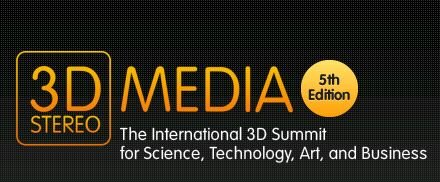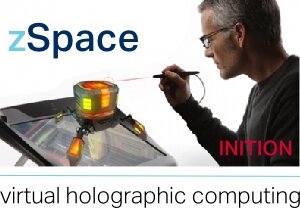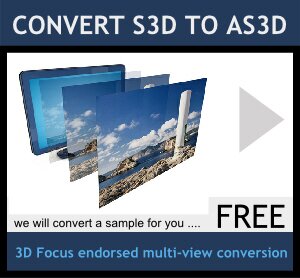
Video Eyewear specialists Vuzix Corporation are making progress with its WaveGuide technology for advanced augmented reality glasses
The ambitious Britsh company was founded ten years ago and has been developing advanced proprietary display technology for the military and industrial sectors. Thanks to the publicity surrounding Google Glass, the company has been featured a lot in the media as their technology is often compared.
 I met the Vuzix team at the AR Summit in London and was shown some breakthough technology called WaveGuide but I was first introduced to the Vuzix M100 – a soon to launch pair of augmented reality smart glasses designed for smart phones that takes visuals hands free. An SDK has been made available to developers to produce bespoke apps for the device which displays basic web content and other data in a small full colour 16:9 WQVGA display which hovers above one of the user’s eyes.
I met the Vuzix team at the AR Summit in London and was shown some breakthough technology called WaveGuide but I was first introduced to the Vuzix M100 – a soon to launch pair of augmented reality smart glasses designed for smart phones that takes visuals hands free. An SDK has been made available to developers to produce bespoke apps for the device which displays basic web content and other data in a small full colour 16:9 WQVGA display which hovers above one of the user’s eyes.
3-degree of freedom head tracking is achieved using a gyro, accelerometer and mag/integrated compass plus GPS adds spacial and positional awareness. Like Google Glass, an integrated camera enables 720p video recording and still image capture which can be stored on a microSD card. This combination means, with the right app, the smart glasses can determine where and what you are looking at, enabling seamless actions relevant to your environment and objects in your proximity.
One of the apps that has been created is hands free working in a warehouse so a fork lift driver wearing the glasses can see augmented data such as incoming pick requests, guidance to the correct aisles and barcode scanning (just by looking at the object). This would have been very useful for me when I was a Tesco.com shopper which was a race-against-the-clock to find all the products on a customer’s shopping list!
Another scenario Vuzix imagines is when people are out shopping and spot an interesting item on the shelf. A quick snapshot of the barcode and the smart glasses enhanced app goes off to the Cloud, finds the product and competitive product and displays the data. If a more attractive offer is available elsewhere, the wearer can instantly place their order, then and there.
The M100 is expected to be released for approximately $800 in the last quarter of this year but the developer kit is already available. The SDK can convert existing Android applications suitable for the small display.
The most obvious question is how the M100 will compare to the Google Glass, due for consumer launch next year but a spokesman wasn't concerned saying: “The differences are that the Google Glass is more consumer focused and always relies on the cloud. Our product is designed for professional uses and stores applications independently."
However, the company does have its sights on the prosumer market too, especially for active sports people such as skiers and cyclists.
Looking through the prototype M100 was quite bizarre. When you are fed information into one eye and not the other, you are seeing a transparent image which is the same issue with any binocular display. Ideally future smart glasses will feed matching information to both eyes so stereoscopic images are perfectly augmented into the real world.
Vuzix WaveGuide demo using pico projector
What was more impressive was a demo of the new Vuzix WaveGuide technology which will be integrated into Vuzix smart glasses next year and will compete with Google Glass. During the AR Summit, they were showing the only simulation in Europe of the technology which will significantly improve augmented reality smart glasses. Waveguides are a revolutionary way of moving light. The image is injected into a 1.4mm thin waveguide like a fibre optic and not bent through bulk material like conventional optics. This improves mass, cost, volume, simplicity and optical performance.
In the noise of the summit, I failed to grasp how it really works but it was like looking at an image hovering in mid air. Another advantage is by changing the frequency, objects can appear at different distances through the lens. I tried to take a picture but as you can see above they did not come out too well. If this could somehow be incorporated into a stereo pair combined with highly accurate tracking, Keiichi Matsuda's hyper reality dream could be … reality:
With less than 30 staff worldwide, Vuzix are an impressive company who will be offering genuine alternatives to Google Glass next year.
FREE WEEKLY 3D NEWS BULLETIN –



 I met the Vuzix team at the AR Summit in London and was shown some breakthough technology called WaveGuide but I was first introduced to the Vuzix M100 – a soon to launch pair of augmented reality smart glasses designed for smart phones that takes visuals hands free. An SDK has been made available to developers to produce bespoke apps for the device which displays basic web content and other data in a small full colour 16:9 WQVGA display which hovers above one of the user’s eyes.
I met the Vuzix team at the AR Summit in London and was shown some breakthough technology called WaveGuide but I was first introduced to the Vuzix M100 – a soon to launch pair of augmented reality smart glasses designed for smart phones that takes visuals hands free. An SDK has been made available to developers to produce bespoke apps for the device which displays basic web content and other data in a small full colour 16:9 WQVGA display which hovers above one of the user’s eyes.






















